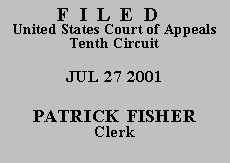

|
ROBERT AUSTIN BARTLETT, |
|
| v. | |
| KENNETH S. COHEN,
Defendant-Appellee. |
On February 10, 2000, Robert Austin Bartlett filed this diversity action against his former attorney, Kenneth S. Cohen. He alleged that Mr. Cohen was negligent in representing him in divorce proceedings in Teton County, Wyoming. He further asserted that Mr. Cohen engaged in fraudulent conduct and wrongfully abandoned him. Mr. Bartlett's complaint asserted claims for breach of contract, breach of fiduciary duty, fraud, and negligent misrepresentation. As this is a diversity case, we must apply the substantive law of Wyoming. See Marathon Ashland Pipe Line LLC v. Maryland Cas. Co., 243 F.3d 1232, 1236 (10th Cir. 2001).
The district court granted the defendant Mr. Cohen's motion for summary judgment. It reasoned that Mr. Bartlett's claims were barred by the two-year statute of limitations set forth in Wyo. Stat. § 1-3-107(a) for "cause[s] of action arising from an act, error[,] or omission in the rendering of licensed or certified professional or health care services." Wyo. Stat. § 1-3-107(a). The court stated: "Whether plaintiff's claims are cast in terms of negligence or breach of contract, they still involve acts or omissions alleged to have occurred as a part of the attorney-client relationship between the parties." Rec. vol. I, doc. 27, at 15 (Order, filed Sept. 18, 2000).
In support of its conclusion, the district court noted that, in pro se communications to the trial judge in the Wyoming divorce proceedings in November and December 1997, Mr. Bartlett accused Mr. Cohen of "incompetency and malpractice." See id. at 16. Thus, Mr. Bartlett "knew or had reason to know of the cause[s] of action he had against [Mr.] Cohen as early as November, 1997[,] and unquestionably, [o]n December 15, 1997." Id. Because Mr. Bartlett did not file the instant action until more than two years later, the district court concluded that all of his claims were time barred.
On appeal, Mr. Bartlett argues that Mr. Cohen's wrongful conduct continued until February 11, 1998, the date on which the Wyoming state court judge entered an order allowing Mr. Cohen to withdraw from the divorce proceedings. According to Mr. Bartlett, Mr. Cohen breached his representation agreement with Mr. Bartlett on that date. Because he filed the instant action within two years of that date, he maintains that his action is timely. In support of this contention, Mr. Bartlett points to sections of his complaint alleging that Mr. Cohen "failed to honor his original contract commitment regarding withdrawal." See Aplt's Br. at 4-5 (citing Complaint ¶ 31, 46, 60, 76).
Mr. Bartlett's argument is not supported by the record or the applicable Wyoming law. In particular, his complaint, his response to Mr. Cohen's motion for summary judgment, and his appellate brief do not indicate that he has challenged conduct that he could not have discovered until February 11, 1998. As the district court observed, under Wyoming law the statute of limitations begins to run when the plaintiff knew or had reason to know of the existence of a cause of action. See Hiltz v. Horn, 910 P.2d 566, 570 (Wyo. 1996). The fact that the Wyoming state court judge granted Mr. Cohen's motion to withdraw on February 10, 1998, does not undermine the district court's conclusion that Mr. Bartlett knew of Mr. Cohen's alleged misconduct by December 15, 1997, more than two years before the filing of this action. See Rawlinson v. Cheyenne Bd. of Pub. Util.,17 P.3d 13, 17 (Wyo. 2001) (stating that "[a] cause of action accrues when a claimant is chargeable with knowledge of an act, error, or omission") (internal quotation marks omitted); Ryel v. Anderies, 4 P.3d 193, 195 (Wyo. 2000) (stating that a cause of action accrues "when the plaintiff knows or has reason to know that [he] has suffered damage due to another's wrongful act . . . even when the consequences of the wrongful act are not fully known until later"). Accordingly, under Wyoming law we must AFFIRM the district court's grant of summary judgment in favor of Mr. Cohen for substantially the same reasons as set forth in its September 18, 2000, order.
Entered for the Court,
Robert H. Henry
Circuit Judge
*. This order and judgment is not binding precedent, except under the doctrines of law of the case, res judicata, and collateral estoppel. The court generally disfavors the citation of orders and judgments; nevertheless, an order and judgment may be cited under the terms and conditions of 10th Cir. R. 36.3.